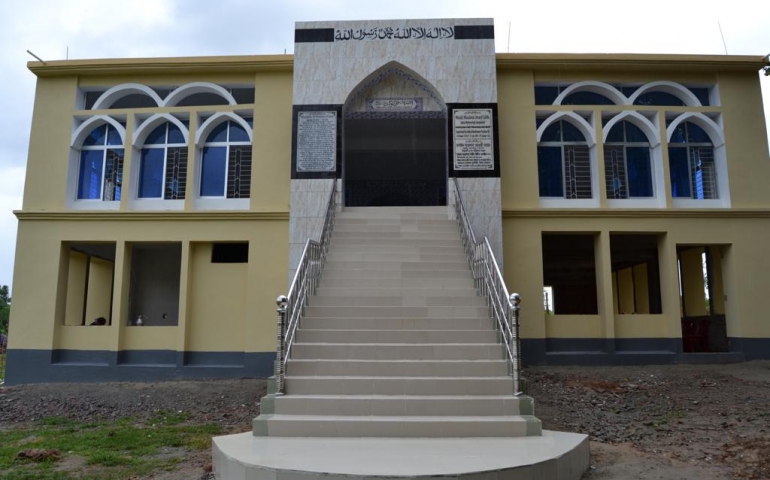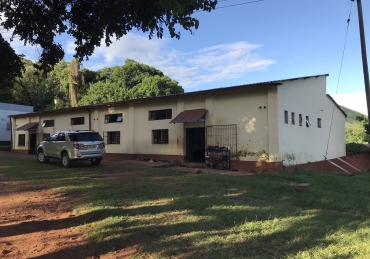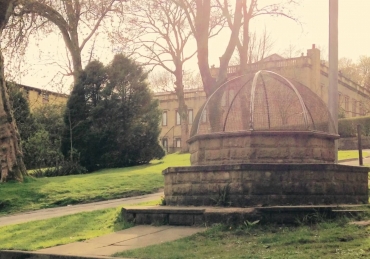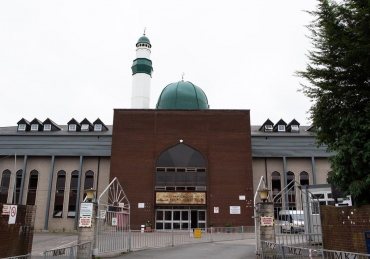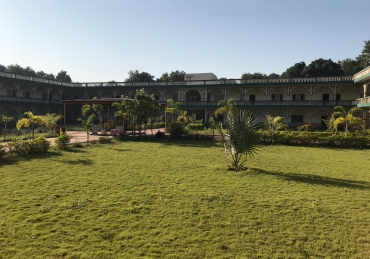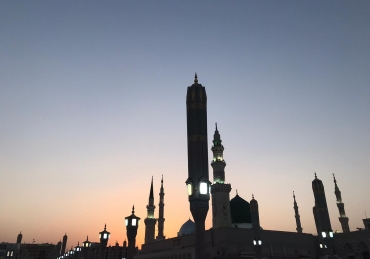Our beloved teacher, Mawlānā ʿUmarjī Ṣāḥib Raḥimahullāh (1360/1942 – 1435/2014)
بسم الله الرحمن الرحیم
Six years have passed since the demise of our beloved teacher, Mawlānā ʿUmarjī Ṣāḥib Raḥimahullāh (d. 1435/2014). This morning, I was reading some archive emails and documents, and came across some information which I thought would be useful to collate in a short article. At the time, I was unable to pen an obituary, so this can also fill that void. What follows is in no particular systematic order, it is random with the aim of giving readers a brief glimpse into the life of our beloved teacher.
For over a decade until his demise, our respected Shaykh al-Ḥadīth Mawlānā Muḥammad Yūnus Jownpūrī (d. 1438/2017) would visit the UK in Shaʿbān upon the invite of Darul Uloom Blackburn. Some of the UK’s leading scholars would accompany Shaykh throughout his UK tour from airport to airport. Our respected teacher, Mawlānā ʿUmarjī Ṣāḥib Raḥimahullāh was from among them. He had immense respect and admiration for Shaykh. His unwavering loyalty was such that he continued accompanying Shaykh every year until his demise. Shaykh also visited Mawlānā ʿUmarjī Ṣāḥib’s home in Bolton. I recall on one occasion in Shaʿbān 1434 (2013), I had the honour of reciting ten pages of Sunan al-Tirmidhī to Shaykh at Mawlānā’s residence. Two months later, in Shawwāl 1434 (2013), we also visited Mawlānā’s home, this time with Mufti Aḥmad Khānpūrī Ṣāḥib (b. 1365/1946), who knew Mawlānā since their days of study in Rander.
It was June 2014/Shaʿbān 1435 and Shaykh Muḥammad Yūnus Jownpūrī had arrived to Blackburn. As per routine, we were part of the convoy with Shaykh. Along with spending time with Shaykh, it was also an opportunity to spend time with my teachers including Mawlānā ʿUmarjī Ṣāḥib. Mawlānā was a very friendly, humble and easy-going teacher who was very affectionate towards me and my elder brother, Mufti Muhammad. He had kindly graced me with his presence at my Walīmah in January 2013 and phoned me requesting if his son or grandson can accompany him so he does not have to drive.
On Saturday 7th June 2014, the completion of Ṣaḥīḥ Bukhārī took place at Darul Uloom Blackburn. Shaykh Muḥammad Yūnus Jownpūrī would generally stay in Darul Uloom Blackburn for most of his stay in the UK. It was his second home and he felt at ease here. Mawlānā ʿUmarjī Ṣāḥib would also stay here and accompany Shaykh throughout the trip. In the evening, I still vividly recall, a few of us including my brother who was Shaykh’s driver, were sat in the prayer hall of the Darul Uloom eating food. Mawlānā ʿUmarjī Ṣāḥib also sat with us sharing his light hearted humour. He had already eaten dinner so he merely sat with us to give us some company. There was no suggestion of any medical issues or pain at this point. He sat with us in the usual manner. Thereafter, we all rested for the night, we went home, and Mawlānā’s resting place was the small library on the ground floor, to the left of the main Masjid area in Darul Uloom Blackburn.
In the morning at Fajr Ṣalāh time, Mawlānā did not wake up. This came as a shock to all of us. The ambulance was called and it was confirmed that he had passed away. He spent his life among books and his final moments in this world were spent among books. It was a Sunday and therefore it was difficult to make funeral arrangements for the same day. Arrangements were made for the following day.
As per the schedule, we travelled with Shaykh Muḥammad Yūnus Jownpūrī to Kidderminster for the joint completion of Ṣaḥīḥ al-Bukhārī of the Darul Uloom Bury and Madinatul Uloom students. Thereafter, the convoy travelled to Leicester and spent the night there.
The following morning, on Monday 9th June 2014, we travelled from Leicester to Bolton, where after Ẓuhr Ṣalāh, the Janāzah Ṣalāh was led in Tayyabah Masjid by our respected teacher Ḥaḍrat Mawlānā Yusuf Motala Ṣāḥib Raḥimahullāh (d. 1441/2019) who had also visited Darul Uloom Blackburn yesterday morning. It was a sad day. We proceeded to the Bolton cemetery. Mawlānā ʿUmarjī Ṣāḥib’s son, Mawlānā Rashīd Ṣāḥib requested Shaykh Muḥammad Yūnus Jownpūrī to make the final supplication. I was in the same car as Shaykh. It started raining. Shaykh commented, “The sky is pouring over Mawlānā ʿUmarjī Ṣāḥib, and this is Allah’s mercy upon him” (This has been quoted in an earlier answer entitled: Rainfall after a burial).
As we left the cemetery, Shaykh mentioned at some point, “I did not know that Mawlānā ʿUmarjī had so much love and affection for me” (that Allah Almighty decreed the timing of his death in a way that I was able to participate in his Janāzah Ṣalāh). His sons later informed me that there were two events which Mawlānā Raḥimahullāh would always eagerly look forward to every year: (1) The annual ʿUmrah journey and (2) The visit of Shaykh Muḥammad Yūnus Jownpūrī to the UK.
Soon after his demise, my respected brother Mufti Muhammad suggested that the least we can do is create a Ṣadaqah Jāriyah project and construct a Masjid for his reward in any developing country. After seeking permission from Mawlānā’s children, we requested colleagues in Bangladesh to identify a suitable project. Al-Ḥamdulillāh, a £20,000 project was identified in Salura, Mymensingh, Bangladesh. This project was successfully completed and inaugurated on 14 Shawwāl 1436 (31 July 2015). The project was funded by the family and students of Mawlānā Raḥimahullāh and a significant amount was donated by my brother. A brief video is available below featuring the inauguration of the Masjid. Al-Ḥamdulillāh, the Masjid is fully operational and a Maktab is also running here.

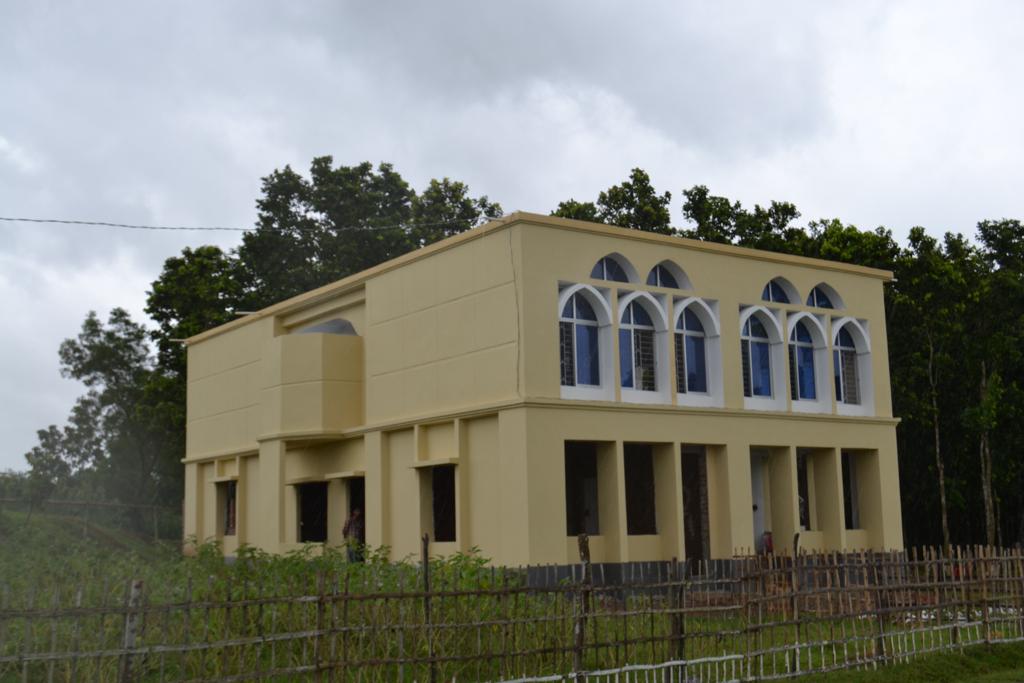

The following message that was circulated at the time provides an overview of the Masjid:
‘SADAQAH JARIYAH PROJECT FOR MARHOOM HADHRAT MOULANA UMARJI SAHIB RAHMATULLAHI ALAYH
A group of students of Hadhrat Moulana Umarji Sahib Rahmatullahi Alayh have decided to build a Masjid in Bangladesh with Maktab and Water facilities for the Isaale Thawaab of Hadhrat Moulana Umarji Sahib Rahmatullahi Alayh.
The total cost of the Project is £20,000. This includes the construction of an 1828 SQF Masjid that will cater for 230 Musallis. The Masjid will have an ablution area for 20 people, two toilets and a water pump and water tank. The project also includes the running of a Maktab.
The Masjid will be located in a remote village in Bangladesh in Mymensingh that has no Masjid or Maktab facilities within 2-3 miles radius. Insha Allah, the project will be very beneficial.
All students of Hadhrat and others are requested to support this Sadaqah Jariyah project. To donate, please contact any of the following students of Hadhrat (numbers have been deleted):
- Moulana Yusuf Shabbir (Blackburn)
- Moulana Rafiq Sufi (Blackburn)
- Moulana Yunus Mohammed (Bolton)
- Moulana Vasiyullah (Preston)
- Moulana Irfan Mehter (London)
- Moulana Yunus Dudhwala (London)
- Moulana Javid Iqbal (Birmingham)
- Moulana Zakaria (Leicester)
- Moulana Khalil Kazi (Batley)
- Moulana Ahmed Desai (Bradford)
- Moulana Abdur Raoof (Dundee)
- Moulana Wasim Amin (Glasgow)
- Moulana Umair (Glasgow)
Please circulate in particular to all students of Hadhrat Moulana Rahmatullahi Alayh. May Almighty Allah shower his mercy on Hadhrat Moulana and elevate his status in Jannah. Ameen.
Jazakallah’
The Masjid was named: ‘Masjid Maulana Umarji Sahib’. A stone plaque was placed at the entrance of the Masjid on the right side of the staircase which mentions the name of the Masjid and the inauguration date.
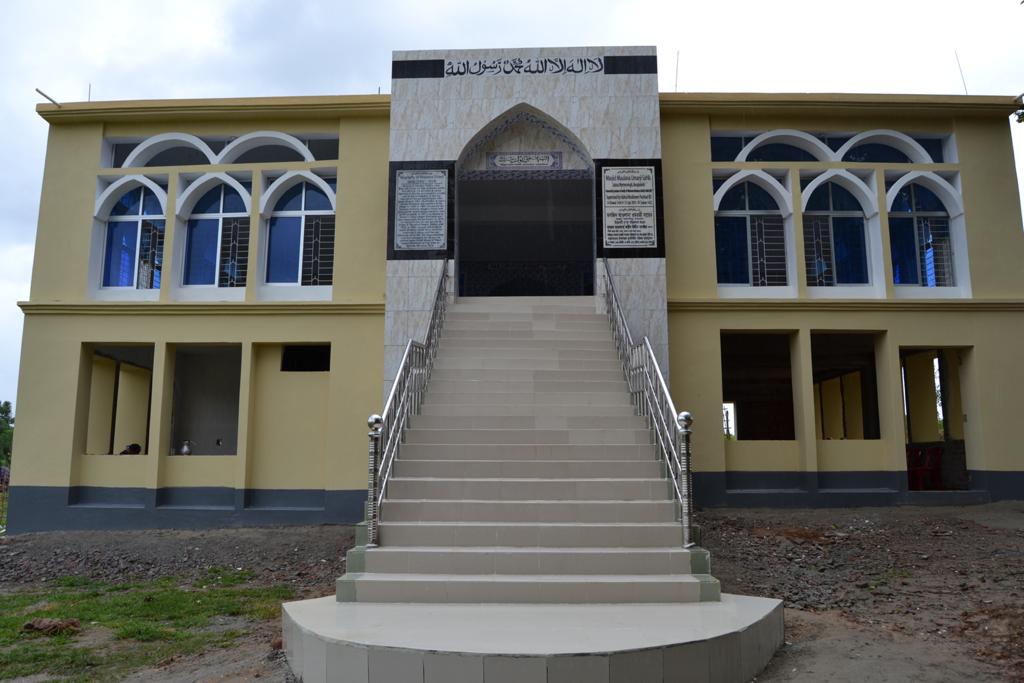
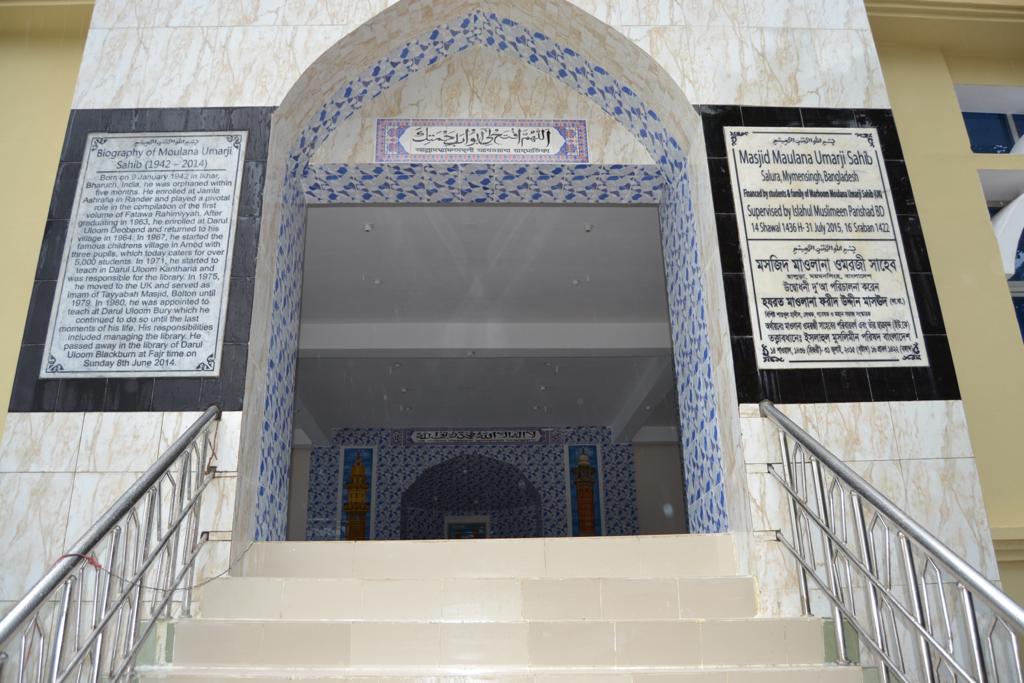
On the left side, there is another stone plaque which provides a brief biography of Mawlānā.

A summary was written based on information shared by his sons. The summary is as follows, followed by the brief biography penned by his sons:
‘Born on 9 January 1942 in Ikhar, Bharuch, India, he was orphaned within five months. He enrolled at Jamia Ashrafia in Rander and played a pivotal role in the compilation of the first volume of Fatawa Rahimiyyah. After graduating in 1963, he enrolled at Darul Uloom Deoband and returned to his village in 1964. In 1967, he started the famous children’s village in Amod with three pupils, which today caters for over 5,000 students. In 1971, he started to teach in Darul Uloom Kantharia and was responsible for the library. In 1975, he moved to the UK and served as Imam of Tayyabah Masjid, Bolton until 1979. In 1980, he was appointed to teach at Darul Uloom Bury which he continued to do so until the last moments of his life. His responsibilities included managing the library. He passed away in the library of Darul Uloom Blackburn at Fajr time on Sunday 8th June 2014.’
The following is the brief biography penned by his sons with some minor amendments:
BRIEF BIOGRAPHY
‘Hadrat Moulana Umarji Sahib was born on 9th January 1942 in Ikhar, Baruch, Gujarat India. At a very tender age of just 5 months, his father passed away. He became an orphan and his mother raised him. He was the youngest of the four brothers.
He began his early education at the local Madrasah and school. He was naturally gifted with sharp memory and intelligence. Occasionally, his school teacher would make him sit on a raised table and ask him to explain the lesson to the entire class. His teacher at Madrasah would ask him to do the same. As a result, there was a dilemma in the family as most of them wanted him to pursue an academic career by going to college and university whereas his Madrasah teacher wanted him to become a religious scholar. Eventually, the latter succeeded and enrolled him in the world-famous Islamic seminary Jamia Ashrafiyyah, Rander, Gujarat, India. Here, he studied under the high-ranking scholars and experts of the various Islamic sciences.
While studying, he assisted and became instrumental in compiling the 1st volume of the famous Fatawa Rahimiyyah. After graduating in 1963, he travelled to Darul Uloom Deoband to further his studies. The following year in 1964, he returned to his home town Ikhar and was appointed as the Imam in the local Masjid. In 1965, he got married. At that time, there were many innovations in the villages. Thus, he worked extremely hard to reform people which was a challenging task.
In 1967, Moulana Ahmed Achodi took him to Amod where he started the famous ‘bacho ka ghar’ with two or three students. Today, it serves more than 5,000 students. Thereafter, in 1971, Moulana Adam Manubari Sahib, the principal of Darul Uloom Kantharia took him to teach there; this is the first Darul Uloom in the whole Bharuch region.
Along with his teaching responsibilities, he was tasked to manage the main library of the Darul Uloom. He was also the principal advisor to Moulana Adam Sahib.
After serving here for four years, in 1975, he moved to England. For the next four years, he served as Imam and teacher at Tayyabah Masjid Bolton. Thereafter in 1980, he was appointed to teach in Darul Uloom Bury, a role in which he served until he passed away.’
I had the honour of studying several books with him: Uṣūl al-Shāshī, Mirqāt, Hidāyah (vol 4), Muʿīn al-Farāiḍ and Shamāil al-Tirmidhī. He was an expert on the laws of inheritance. He was extremely intelligent and quick-witted and would share his pearls of wisdom. Students would look forward to his lessons and would request him to share his anecdotes (Qiṣṣah). He had a very good sense of humour and would frequently mention jokes. Many of his anecdotes and jokes would have an underlying point of learning and reflection. However, during the lessons of Shamāil al-Tirmidhī, I do not recall him joking once. This was out of respect for the Ḥadīths of the Prophet ﷺ.
Mawlānā Raḥimahullāh was extremely punctual and principled. His lessons were scheduled in the afternoon. He would arrive at 12.30pm well before the afternoon session start time and would stay until approximately 5.45pm. His room in Darul Uloom Bury also served as a mini-library from where students would collect their curricular books at the beginning of the year and return them at the end of the year. This is a responsibility which he fulfilled diligently for many years.
In Taṣawwuf, Mawlānā Raḥimahullāh had ijāzah from Shaykh Muḥammad Yūnus Jownpūrī and Shaykh Yūsuf Motālā. Some of his dictums include:
- “I never sat cross legged ever in class during the nine years I spent as a student in Rander, India.”
- “Do some Isāale Thawāb (sending of reward) for the author of the book, before embarking on its study, you shall benefit from this.”
- “Almighty Allah is not unashamed that He would starve those who serve his Deen.”
- “I feel ashamed to present my face before Allah if I have not performed at least one Ṭawāf during the day.”
- “The sleep of a scholar is a form of worship if the intention is to renew his energy to continue the work of Dīn.”
- “Imam Fakhr al-Dīn al-Rāzī is the Imam of the Mutakallimūn (Kalām scholars).”
- “A person’s intelligence certainly contributes to acquiring knowledge. However, a person should not boast or have pride upon his intelligence. Instead, one should rely upon Allah.”
TWO DREAMS
As the construction of the Masjid was underway in Bangladesh, a student of Mawlānā Raḥimahullāh saw him in a dream on 7 February 2015. The following was shared with colleagues at the time:
“Hadrat Moulana Umarji Sahib Marhoom Rising and Travelling in Jannah
A student of Hadrat Moulana Umarji Sahib Marhoom saw a dream on 7 Feb 2015. He and Hadrat Moulana are travelling together in a car in Dewsbury. The student asks him, what happened to you (in terms of Hisaab)? He replied, nothing much. The student asks him, where is your residence? He replies, I move around and I don’t have a fixed place. I meet many people. The student asks, have you met any of the Sahabah? He replies, yes, I have met many Sahabah. The student asks, have you met the Prophet (peace be upon him)? He replies, I have not met him yet. Thereafter Hadrat Moulana made reference to the different types of clothes in Jannah which you do not get in the world and mentioned a type of wool.
Subhanallah, Hadrat Moulana’s status continues to rise in Jannah and he is honoured with the different clothes of Jannah and with the company of Sahabah. May Allah elevate his status and give us all the Taufeeq to follow in his footsteps.
May Allah reward all those who participated in the Masjid Isaale Thawab project. The Masjid will be complete by the end of March Insha Allah.
Subsequently, on 16 March 2015 at Fajr time, I saw a dream. I was walking in the upstairs passage of Darul Uloom Bury’s main building from the library towards the bank. Mawlānā ʿUmarjī Ṣāḥib was coming towards the library and had passed Ḥāfiẓ ʿAlī’s class. I meet him in the passage. He mentions that Mawlānā Ḥanīf (Dudhwala) phoned regarding the Masjid and they both agreed that I (Yusuf Shabbir) should visit the Masjid. (Unfortunately, I have been unable to visit Bangladesh since).
Mawlānā Raḥimahullāh was an embodiment of Taqwā, Ṭahārah, simplicity and profound wisdom. Most graduates of Darul Uloom Bury are his students including some of the leading scholars of the UK. May Allah Almighty accept his life-long service and grant him an eternal abode in Jannat al-Firdaws. Āmīn.
Yusuf Shabbir
9 Ṣafar 1442 / 27 September 2020

